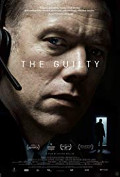
Denmark 2018
Directed by
Gustav Moller
85 minutes
Rated R
Reviewed by
Bernard Hemingway


Guilty, The
Synopsis: Danish police officer Asger Holm (Jakob Cedergren) is working in an emergency call centre when he receives a call from a frightened woman and long day’s journey into the night is about to begin for him.
The Guilty is above all a film buff’s film. Not that it is a cinematic tour de force or mind-blowing conceptual enigma. Quite the opposite, it is an extraordinarily simple film and therein lies its brilliance, or at least the core of it.
Gustav Möller’s debut film has the same character and only this character on screen virtually throughout its entire running length. There are other characters, quite a few of them in fact, but we know them only by their voices. It’s not only a marvellously economical premise but despite never leaving the call centre and having only intermittent interjections by other members of the centre’s staff as a crime thriller it is as gripping as any Hollywood movie with a zillion times its budget.
The key to the film’s success is the director’s artful script which he wrote with Emil Nygaard Albertsen. Its characters, despite their disembodiment, seem fully present, Indeed, recalling the golden days of radio plays, the script comes so fully alive that it is difficult not to believe that we have actually witnessed what has only been conjured in our imagination.
When we first encounter Asger, nearing the end of his shift, he is bored by the inconsequentiality of the calls people make and he deals with them dismissively. But then comes a call from a woman whom he realizes is being abducted. As he coaches the woman how to communicate with him without alerting her abductor he works calmly using the available computer surveillance equipment to locate her. All the while he is trying piece together what has happened and as he does so he becomes more personally involved not only with the woman but her captor.
What is remarkable about The Guilty is not just the way the film manages to draw us into the events using only voices and sounds like background traffic but the way that it draws us into Asger’s perception of them. With no more than a few lines of dialogue Möller and Albertsen bring us a classic burnt-out morally-compromised cop – about to face trial for some over-the-line business, alone after his wife has left him, his partner his sole trusted friend and, almost despite himself, seeking some measure of redemption. The film’s title is loaded in its references and we are witnesses to not just one but two emotional journeys.
In the lead role Jakob Cedergren give a faultlessly committed performance. Whilst director Möller and cinematographer Jasper Spanning find ways, such as using shadows, or having him move from one computer to another, to relieve him of the burden of constant scrutiny, on screen virtually all the time Cedergren’s eloquent face is the magnet that draws us into the action and holds us there.
As with so many films from Scandinavia and latitudinally-related regions the tone tends to the bleak and the subject matter is confronting. This will, needless to say, work against the film, at least for its Australian release, but especially if you’re one of the aforementioned buffs you really shouldn’t miss this literally exceptional film before your only option is a Hollywood remake.
FYI: The remake, which predictably squandered the very thing that made Möller’s film so impactful - its rigorous minimalism - was directed by Antoine Fuqua in 2021 and starred Jake Gyllenhaal in the lead role.
Want something different?





